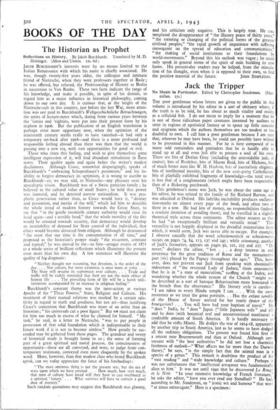BOOKS OF THE DAY
The Historian as Prophet Reflections on History. By Jakob Burckhardt. Translated by M. D. Hottinger. (Allen and Unwin. 125. 6d.) JAKOB BURCKHARDT'S interests were by no means limited to the Italian Renaissance with which his name is chiefly associated. He was, though twenty-five years older, the colleague and intimate friend of Nietzsche, when they were professors together at Basle ; he was offered, but refused, the Professorship of History at Berlin in succession to Von Ranke. These two facts indicate the range of his knowledge, and make it possible, in spite of his denials, to regard him as a major influence in historical philosophy, coming down to our own day. It is curious that, at the height of the Nietzsche-cult in this country, just before the last War, more atten- tion was not paid to Burckhardt's Weltgeschichtliche Betrachtungen, the series of lecture-notes which, dating from various years between the 'sixties and 'eighties, were put into their present form by his nephew in 1906. But the publication of an English translation is perhaps even more opportune now, when the optimism of the nineteenth century seems really to have vanished—it had only a temporary set-back after 1918—and there is a more profound and responsible feeling abroad than there was then that the world is passing into a new era, with vast opportunities for good or evil. Those who :hare this feeling, and wish to give themselves some intelligent expression of it, will find abundant stimulation in atese notes. Their quality again and again belies the writer's modest disclaimers. Although Croce, somewhat disparagingly, speaks of Burckhardt's " embracing Schopenhauer's pessimism," and his in- ability to forgive democracy its optimism, it is wrong to ascribe to Burckhardt—or, we may add, to Nietzsche—any pleasure over his apocalyptic vision. Burckhardt was of a Swiss patrician family ; he believed in the cultural value of small States ; he held that power was immoral, and he detested narrow nationalism. It was pro- phetic penetration rather than, as Croce would have it, "dismay and pessimism, and inertia of the will," which led him to describe the whole trend of modern history towards the Great State, to say that " in the gentle twentieth century authority would raise its head again—and a terrible head," that the whole morality of the day would be oriented towards security, that democracy would develop an insatiability of demand for State control of the individual, that ethics would become divorced from religion. Although he denounced " the error that our time is the consummation of all time," and proposed as the historian's proper study " the recurrent, constant and typical," he was moved by the—to him—unique events of 5871 to a whole series of brilliant reflections which illuminate the present even more than his own day. A few sentences will illustrate the quality of hiy diagnosis:
" Neither thought nor reasoning, but devotion, is the order of the day.. . . Not culture, but mere existence, is once more at stake. . . . The State will resume its supremacy over culture, . . . Trade and traffic will be rudely reminded that they are not the main object of human life . . . The prevailing form of life will be a harsh utili- tarianism, accompanied by an increase in religious feeling."
Burckhardt's constant theme was the inter-action at various epochs of the "Three Powers," State, Religion and Culture. His treatment of their mutual relations was marked by a certain rela- tivity in regard to truth and goodness, but not art—thus justifying Croce's contention that Burckhardt was more of an artist than an historian ; " his universals cut a poor figure." But we must not claim for him too much in excess of what he claimed for himself. " My task," he said, in a letter to Nietzsche, " was to put people in possession of that solid foundation which is indispensable to their future work if it is not to become aimless." How greatly he suc- ceeded may be gathered from these pages. The grandeur and sweep of historical study is brought home to us ; the sense of forming part of a great spiritual and moral process, the consciousness of opportunity—these are all conveyed, and were, to judge from' con- temporary testimony, conveyed even more eloquently by the spoken word. More, however, than that modest class who heard Burckhardt speak, can we today appreciate the force of his forebodings : " The most ominous thing is not the present war, but the era of wars upon which we have entered. . . . How much, how very much, that men of culture have loved will they have to cast overboard as a spiritual ' luxury.' . . . What survives will have to contain a good dose of eternity."
Such random quotations may suggest that Burckhardt was gloomy,
and his criticism only negative. This is largely true. He con- templated the disappearance of " the illusory peace of thirty years," " the tottering or changing of the political forms of the greatest civilised peoples," "the rapid growth of impatience with suffering consequent on the spread of education and communications," " the shaking of social institutions to their - 'foundations by world-movements." Beyond this his outlook was vague • he could only speak in general terms of the spirit of man building its new home. His present-day readers may be helped, from the stimula- tion of his thought, even when it is opposed to their own, to find the positive material of the future. JOHN STAPLETON.


























 Previous page
Previous page